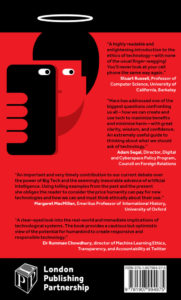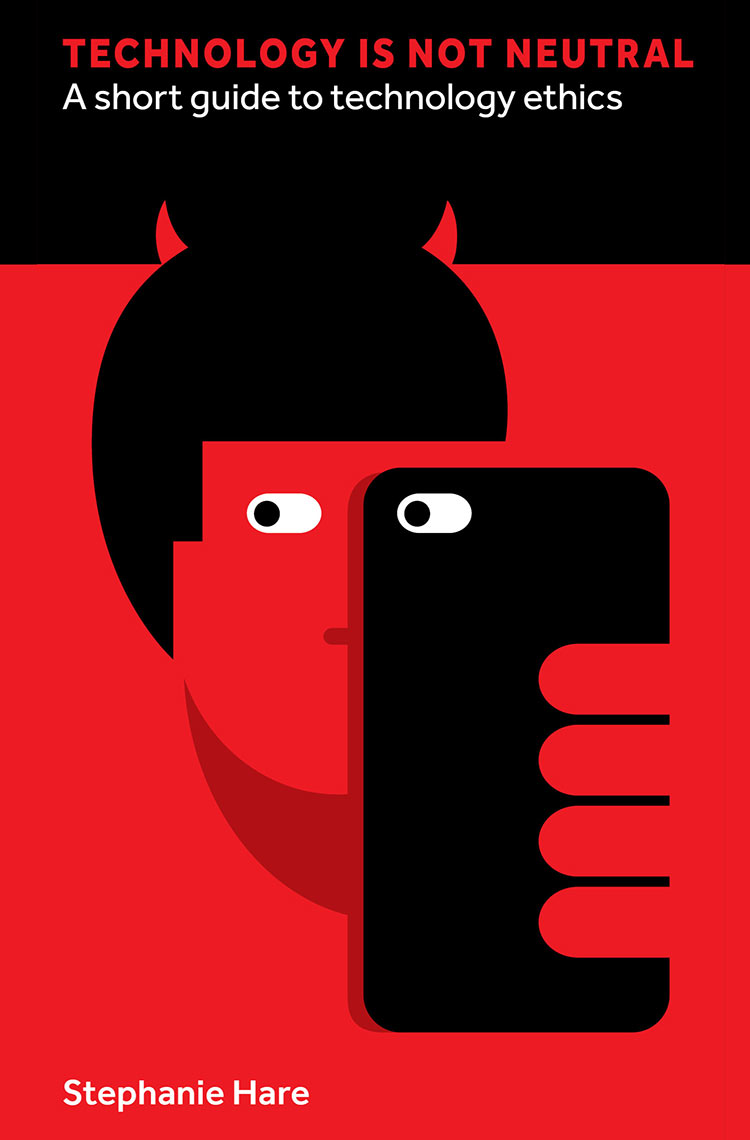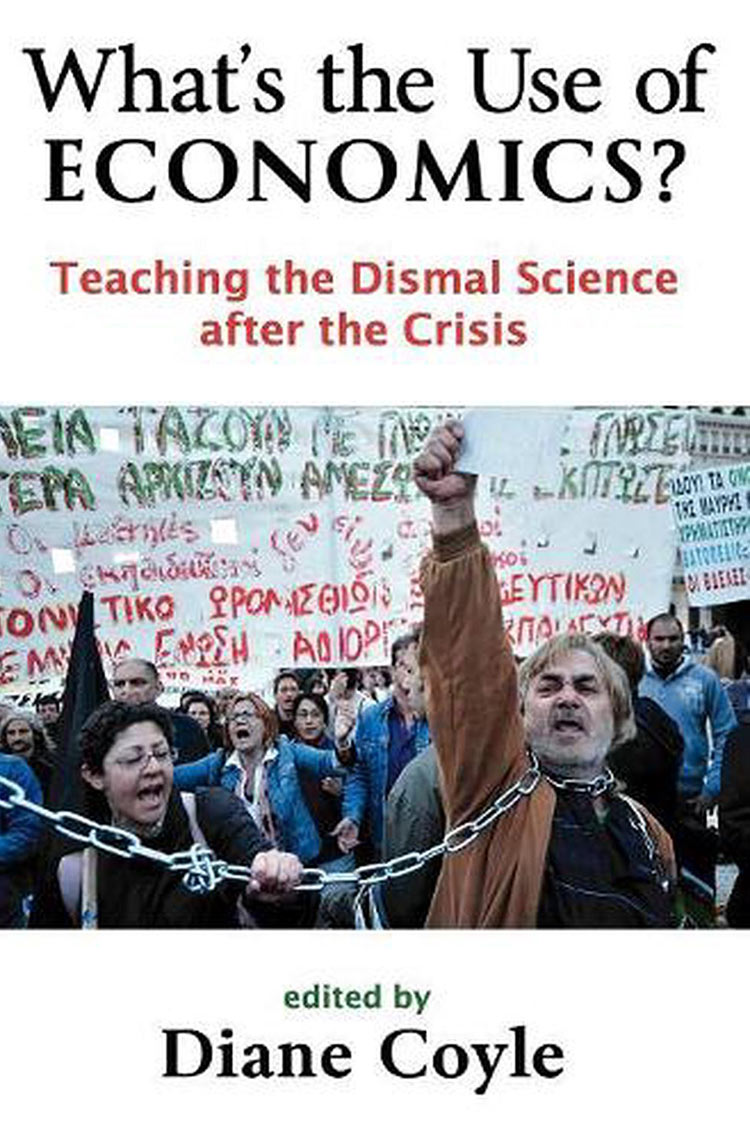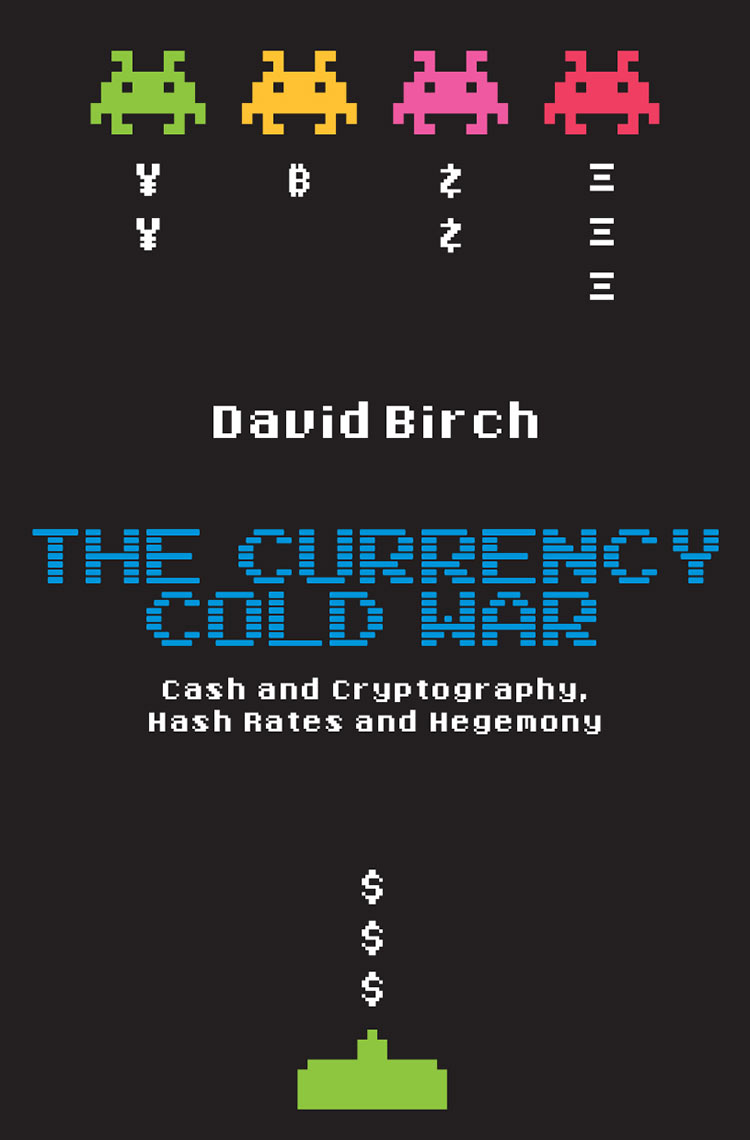Technology is Not Neutral: A Short Guide to Technology Ethics by Stephanie Hare was published on 22 February 2022 as a special hardback volume in London Publishing Partnership’s Perspectives series, edited by Diane Coyle.
You can order a copy of the book (with free UK postage and packing) by clicking the orange “Buy Book” button above. If you wish to order multiple copies, please email lpp@londonpublishingpartnership.co.uk and we will be able to help. The book is also available in ebook form from all the usual vendors, and it will shortly be released as an audiobook with the author narrating.
It seems that just about every new technology that we bring to bear on improving our lives brings with it some downside, side effect or unintended consequence.
 These issues can pose very real and growing ethical problems for all of us. For example, automated facial recognition can make life easier and safer for us – but it also poses huge issues with regard to privacy, ownership of data and even identity theft. How do we understand and frame these debates, and work out strategies at personal and governmental levels?
These issues can pose very real and growing ethical problems for all of us. For example, automated facial recognition can make life easier and safer for us – but it also poses huge issues with regard to privacy, ownership of data and even identity theft. How do we understand and frame these debates, and work out strategies at personal and governmental levels?
Technology Is Not Neutral: A Short Guide to Technology Ethics addresses one of today’s most pressing problems: how to create and use tools and technologies to maximize benefits and minimize harms? Drawing on the author’s experience as a technologist, political risk analyst and historian, the book offers a practical and cross-disciplinary approach that will inspire anyone creating, investing in or regulating technology, and it will empower all readers to better hold technology to account.
Praise for Technology Is Not Neutral
“Our globe-spanning economy, and our social interactions, depend on ever more pervasive digital technology, controlled by governments and multinational conglomerates. We’re confronted by trade-offs between security, privacy and freedom. Stephanie Hare offers the overview that concerned citizens need to ensure that these potentially scary tools aren’t misused. Her book deserves wide readership.” — Professor Lord Martin Rees, Astronomer Royal and author of On the Future: Prospects for Humanity
“A highly readable and enlightening introduction to the ethics of technology – with none of the usual finger-wagging! You’ll never look at your cell phone the same way again.” — Stuart Russell, Professor of Computer Science, University of California, Berkeley and author of Human Compatible: AI and the Problem of Control
“Stephanie Hare makes an important and very timely contribution to our current debate over the power of Big Tech and the seemingly inexorable advance of artificial intelligence. Using telling examples from the past and the present she obliges the reader to consider the price humanity can pay for new technologies and how we can and must think ethically about their use.” — Margaret MacMillan, Emeritus Professor of International History, University of Oxford
“Stephanie Hare has addressed one of the biggest questions confronting us all – how we can create and use tech to maximize benefits and minimize harm – with great clarity, wisdom, and confidence. Drawing on the insights of numerous academic fields as well as concrete, real-world examples, this is an extremely useful guide to thinking about what we should ask of technology.” — Adam Segal, Director, Digital and Cyberspace Policy Program, Council on Foreign Relations
“Technology Is Not Neutral is a clear-eyed look into the real-world and immediate implications of technological systems. The book provides a cautious but optimistic view of the potential for humankind to create responsive and responsible technology, using an interdisciplinary focus that is both engaging and empowering to the reader.” — Dr Rumman Chowdhury, director of Machine Learning Ethics, Transparency, and Accountability at Twitter
“Hare forces us to think critically and with intentionality about the chaos factories beneath the innocent surface of the technology that surrounds us. A thought-provoking, humorous and sometimes frightening look at an issue that needs our urgent attention, from the leading voice in technology ethics. Put the ethics of the ubiquitous cell phones, televisions, apps, surveillance cameras and national identity cards on your radar, and use this book as your guide.” — Rob Chesnut, former Chief Ethics Officer at Airbnb and author of Intentional Integrity: How Smart Companies Can Lead An Ethical Revolution
“This is a state-of-the-art overview of the tech ethics landscape. An original, lucid, extraordinarily comprehensive and compelling account of what we are now having to grapple with in the age of AI and of how we can find a trustworthy way forward whilst learning some stark lessons from the pandemic.” — Lord Clement-Jones CBE
“One of the most common cop-outs for not taking responsibility for technology is that ‘tools are neutral’. If you want to understand why technology is not neutral, and what some of the implications of this are, read this book. A compelling call to develop a culture of technology ethics.” — Carissa Véliz, Associate Professor of Philosophy, University of Oxford, and author of Privacy Is Power: Why and How You Should Take Back Control of Your Data
“Do we need a Hippocratic Oath for technology? Hare makes a strong case for why we might. Technology can be used for good or bad purposes, but rarely is it neutral. From facial recognition technology to Covid-19 exposure notification apps, this book explains why good intentions can so often lead to bad results.” — John Thornhill, “Best Summer books of 2022: Technology“, Financial Times
“I strongly recommend this book. It’s essential reading for policymakers and anyone working in technology, business and finance looking for a practical guide to the increasingly critical field of tech ethics. It’s for all those concerned about issues such as privacy, data ownership and identity theft.” — “The Best Books of 2022 So Far, Picked by FT Readers“, Financial Times

Stephanie Hare is a researcher and broadcaster working across technology, politics and history. Selected for the BBC Expert Women programme, she frequently shares insights on television and radio. Previously she worked as a Principal Director at Accenture Research, a strategist at Palantir, a Senior Analyst at Oxford Analytica, and a consultant at Accenture. She held the Alistair Horne Visiting Fellowship at St Antony’s College, Oxford after earning a PhD and an MSc in Theory and History of International Relations, both from the London School of Economics and Political Science (LSE), and a BA in Liberal Arts and Sciences from the University of Illinois at Urbana-Champaign.
Table of Contents
Introduction
Humans, not cogs in the machine
We begin as data
Why I wrote this book
A short guide to technology ethics
Chapter 1 – Is technology neutral?
The debate
Between the bone and the bomb
Technology is more than tools
Where does responsibility enter the equation?
Conclusion
Chapter 2 – Where do we draw the line?
How do we draw the line (and test that it is in the right place)?
Who draws the line – and who decides when that line has been crossed?
Conclusion
Chapter 3 – Facial recognition technology
Metaphysics: what is facial recognition technology?
Epistemology: how can we learn about facial recognition technology?
Logic: how do we know what we know about facial recognition?
Political philosophy: how does facial recognition technology affect power dynamics?
Aesthetics: what is our experience of facial recognition technology?
Ethics: is facial recognition technology a good thing or a bad thing?
Conclusion
Chapter 4 – Pandemic? There’s an app for that
Immunity passports
Exposure notification apps
Quick response (QR) code check-in
Vaccine passports for domestic use
Conclusion
Conclusion
Towards a culture of technology ethics
The problem with problems
Technology ethics in action
Do we need a Hippocratic oath for technology?
Glossary
Notes
Further reading
Acknowledgements
About the author
Figures
Index


 These issues can pose very real and growing ethical problems for all of us. For example, automated facial recognition can make life easier and safer for us – but it also poses huge issues with regard to privacy, ownership of data and even identity theft. How do we understand and frame these debates, and work out strategies at personal and governmental levels?
These issues can pose very real and growing ethical problems for all of us. For example, automated facial recognition can make life easier and safer for us – but it also poses huge issues with regard to privacy, ownership of data and even identity theft. How do we understand and frame these debates, and work out strategies at personal and governmental levels?



